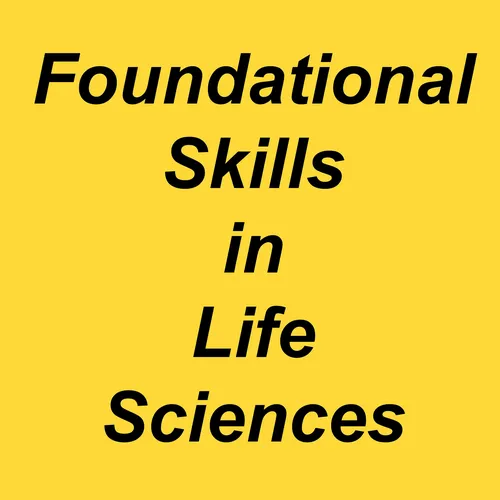
Foundational Skills in Life Sciences
Students and scholars in life sciences need to use many skills to survive and excel during scientific training, which involves listening, reading, writing, and speaking.
But I have seen many of them struggle in understanding and learning those skills.
I am a professor in the U.S., a tenured faculty member with MD, PhD degrees.
I will assist you through the skills, so that you will learn and improve successfully in your professional life.
Please visit my website for more information (https://synaptologica.com/), and send me emails with questions, comments or ideas ([email protected]).
- Update frequency
- every 11 days
- Average duration
- 18 minutes
- Episodes
- 61
- Years Active
- 2023 - 2025

61. How I prepare for teaching how to read papers to professional students
What does it take to prepare a single lecture?
In this episode, I will talk about months-long process for crafting a lecture on how to read clinical papers.
I am passionate about teaching this fo…

60. Postdoc training program (that I organized in my university)
I have set up a training program for the postdoctoral researchers (postdocs) in my home department. Today, I would like to talk about: how and why I have done it, what we do in the program and what (…

59. Happy 2-year anniversary! (plus, how I am scripting episodes)
This podcast is now two years old. And it is the start of the third year! Thank you for listening and for your support!
I would like to give you my behind-the-scenes information, so that you will h…

58. Paragraph 1 of Introduction, written by Nobel Laureates: meaning of each sentence therein
Let’s read the first paragraph of the Introduction section in a paper written by the Nobel Laureates. Specifically, we will read each sentence in the paragraph, and think about the meaning and the ro…

57. How to read the main points of Introduction paragraphs
The Introduction section of a life-science paper tells the main story, sometimes even multiple related ones. But without helpful subheadings, understanding its core points can be challenging. Then, h…

56. How many paragraphs in Introduction?
In combination with the last episode, we will talk about an introduction to how to read the Introduction section. With these two episodes, we will be ready to analyze the content details, from the ne…

55. Does the Introduction section have subheadings?
Sub-sections and subheadings will be helpful.
The Methods and the Results sections of life-science papers are divided into sub-sections. And the sub-sections will have subheadings, i.e., the titles…

54. Can you explain the role of Introduction in one sentence?
The single-sentence rule for understanding research paper Introductions. Have you thought about what the Introduction section of a life-science paper really does?
In this episode, we will address…

53. Minimum features of well-written abstracts
In today’s episode, we will learn which structural components will be minimally essential for an abstract, and which will be additionally necessary for a well-written abstract. These are the abstract…

52. Example of a well-written abstract (other than the one by Nobel Laureates)
Let’s talk about an excellent abstract that I read this week. It was so well written, and I was so excited to read it that I wanted to talk about it with you today. The beauty of it is that the first…

51. Have you read an abstract that was not written well?
My students selected a paper to read in a journal club. The abstract (and the rest of the paper) was not written well. The abstract gave us two precious lessons.
- Lesson 1: Good structural organization…

50. Happy 50th episode!
We have reached 50 episodes! Thank you for listening.
Today, we will briefly talk about how I have kept sustainable podcasting so far. The most important thing may be that I have set my goal simple…

49. Another well-crafted logic loop in Abstract by Nobel Laureates (mini-series: reading-30)
We will talk about the second of the two, well-crafted loops of logic, in the Abstract of a paper written by the Nobel Prize Laureates.
Not all abstracts have this second loop. But when it is present…

48. Well-crafted logic loop in Abstract by Nobel Laureates (mini-series: reading-29)
I can visualize two well-crafted loops of logic, in the Abstract of a paper written by the Nobel Prize Laureates. Can you?
We will talk about one of them in today’s episode. Such a loop, together w…

47. Why is the 2nd sentence important in an abstract? (mini-series: reading-28)
Let's analyze a single sentence in the Abstract of an impressive paper. It is the paper that led to the 2023 Nobel Prize in Physiology or Medicine. This is the paper that we call the milestone articl…

46. Let’s analyze the Abstract of a paper written by Nobel Laureates (mini-series: reading-27)
Today, we will analyze the Abstract of an impressive paper. It is the paper that led to the 2023 Nobel Prize in Physiology or Medicine. This is the paper that we call the milestone article 1.
We wi…

45. Let’s read the Abstract of a paper written by Nobel Laureates (mini-series: reading-26)
Today, we will take a significant step towards understanding the 2023 Nobel Prize in Physiology or Medicine. We will read the Abstract of the Laureates’ most important paper that led to the Nobel Pri…

44. An evolving reader: my phases through reading textbooks (Q&A-5: textbooks, part 2)
How are you reading life-science textbooks?
My approach to reading textbooks has evolved significantly throughout my academic career, from student to researcher to instructor to course director. To…

43. An evolving reader: my phases through reading textbooks (Q&A-5: textbooks, part 1)
How are you reading life-science textbooks?
My approach to reading textbooks has evolved significantly throughout my academic career, from student to researcher to instructor to course director. To…

42. Happy Holidays!
Happy Holidays to you, and I wish you the very best in 2025!